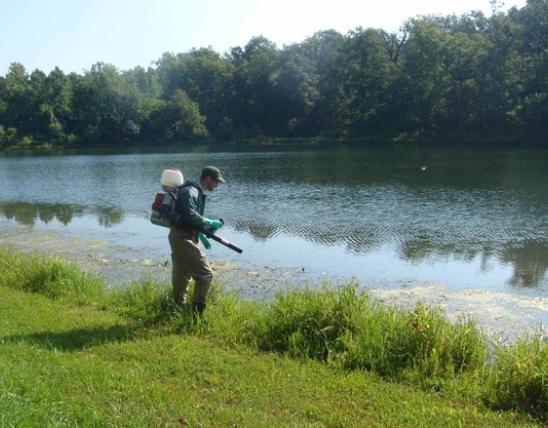Wild parents know what’s best for their babies. They give them a home and yummy things to eat. They keep them away from danger, and some show their young how to care for themselves. Read on to see how eight Missouri wild critters raise their babies.
Worms Anyone?
Finding worms to feed their babies keeps mom and dad robin busy. For the first few days after hatching, the blind, featherless nestlings can’t eat solid food, so the parents gulp a worm, regurgitate it and feed their babies what comes up. As the young grow, they first eat small worm pieces, then the whole wiggly creature. After the babes have a full coat of feathers, the parents bring less food. Hunger makes the young robins eager to leap out of the nest and follow their parents. Unable to fly right away, the fledglings spend several days on the ground while mom and dad bring snacks and watch for danger. If a cat or other carnivorous critter approaches, the parents make a lot of noise and fly away from the fledglings to distract the predator.
Shake, Rattle, and Slither
Before her young are born, a mother timber rattler looks for a safe nursery in a hollow log or tree stump with the right amount of sun to keep the family warm. There, she gives birth to 10-inchlong babies. If danger approaches, she wraps herself around her young and shakes her rattles, letting the predator know that she is armed with venom and ready to use it. When the small snakes are about 2 weeks old, they outgrow their skin and shed it for the first time. After each shed, a new rattle appears. Armed with their first rattle, the young go off on their own.
Bones "R" Us
Raising a litter of frisky fox pups takes two. The dad brings food to the mom for the first week after the pups are born. Then the mom hunts at night, and the dad goes out during the day. As they grow, fox pups play with each other and with bones left over from past meals. If the family moves to another den, the parents take the pups’ playthings with them. Hunting lessons begin when the pups are 7 weeks old. The parents show them how to stalk and pounce on rabbits and mice. When they’re about 5 months old, the pups are ready to go out on their own.
Underwater Nursery
A daddy catfish cares for his young alone. First he hollows out an underwater nest in a river bank or under a log or boulder. After mom lays the eggs, she leaves and dad stays with the nest. He gently fans the eggs with his tail. The moving water keeps the eggs clean and gives them the oxygen they need. Without fanning, the eggs won’t hatch. If an egg-eating fish swims by, dad chases it off. For a week or so after the eggs hatch, dad hangs out with the fry (young fish) to chase off hungry predators.
Along for the ride
A mother opossum is a traveling nursery. She carries her tiny babies in a special pouch on her belly, where they stay for more than two months. She can open her pouch to let the babes sun on nice days. If she has to swim across a stream, she closes her pouch tight to keep her little ones dry. After the babies get too big for all of them to fit in the pouch, they take turns hitching a ride on mom’s back.
Safety in the grass
White-tailed deer fawns hang out with their mom for more than a year. When first born, fawns can stand but can’t run. So, while mom forages for food, her babies lie low in tall grass or brush. Their lack of scent and spotted brown coat make it difficult for predators to find them in their hiding place. Mom stays within earshot and nurses them when they are hungry. When the fawns are about a month old, they follow their mom as she looks for tasty twigs and tender plants to munch. They stay with her until spring when she gives birth again.
Distraction reaction
Killdeer hatch in April through July. Killdeer babies peck out of their eggs with coats of wet, downy feathers and eyes wide open. After their feathers dry, the fuzzy chicks are on the move. They leave their nest that is on the ground and follow their parents to grassy areas to catch their own dinner—a beakful of juicy insects. The chicks learn to fly when they are about 3 weeks old, but stay with their parents all summer. If a hungry coyote approaches, the mom or dad killdeer runs away from the chicks and pretends to have a broken wing. The predator follows the “injured” bird hoping to score an easy meal. When the coyote has been led far enough away from the chicks, the parent flies off to safety, loudly calling kill-dee.
Piggyback Spider Style
Wolf spider moms carry their offspring around, too. First the mother spins a silken sac around her eggs. She carries the sac with her as she stalks and catches insects to eat. When the spiderlings hatch, they climb on her back. She gives them a free ride for several weeks until they’re able to hunt by themselves.
Protect wild babies
Wild parents watch their children until they are old enough to care for themselves. You, too, can protect animal babies. Here’s how:
- Keep an eye on family pets. If you see a mother bird squawking at a cat or dog, the pet is probably getting too close to a fledgling. Take the pet indoors so the parents can continue to feed their young.
- Tell friends to leave wild babies alone. If you see someone with a baby bird, newborn rabbit or a small fawn, help them take the animal back to where it was found. The parents will be looking for their baby and may not come back until you go away.
- Help your parents check for nests before trimming bushes. Wait until birds fledge before cutting brush. Baby animals are sometimes easy to catch, but it’s better for the babes if you sit close by and quietly watch the parents care for them. How many baby animals can you find in your backyard this spring and summer? Safety in the grass
And More...
This Issue's Staff
Bonnie Chasteen
Chris Cloyd
Peg Craft
Les Fortenberry
Chris Haefke
Karen Hudson
Regina Knauer
Kevin Lanahan
Joan McKee
Kevin Muenks
Noppadol Paothong
Marci Porter
Mark Raithel
Laura Scheuler
Matt Seek
David Stonner
Nichole LeClair Terrill
Stephanie Thurber
Alicia Weaver
Cliff White
Kipp Woods






















